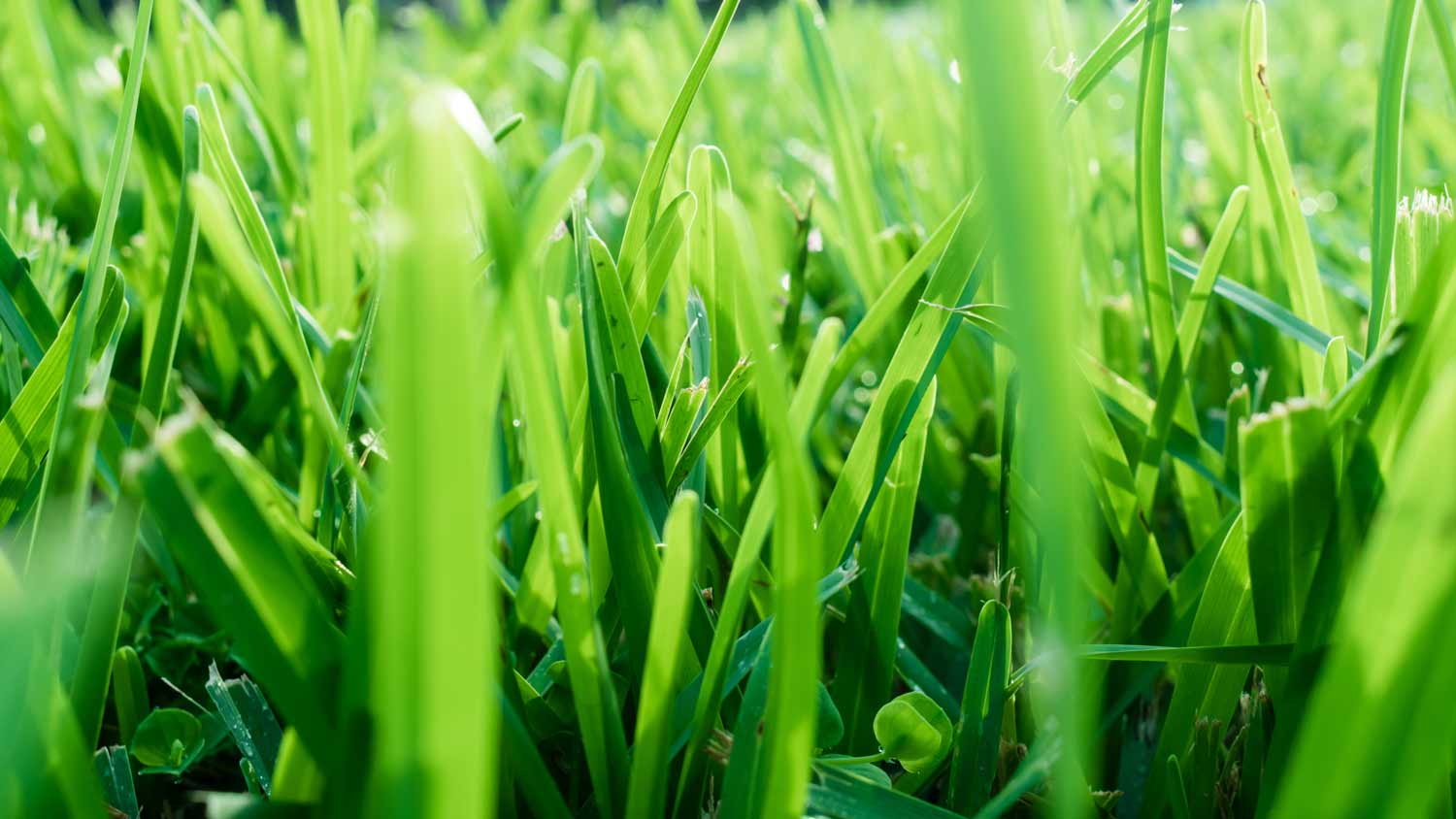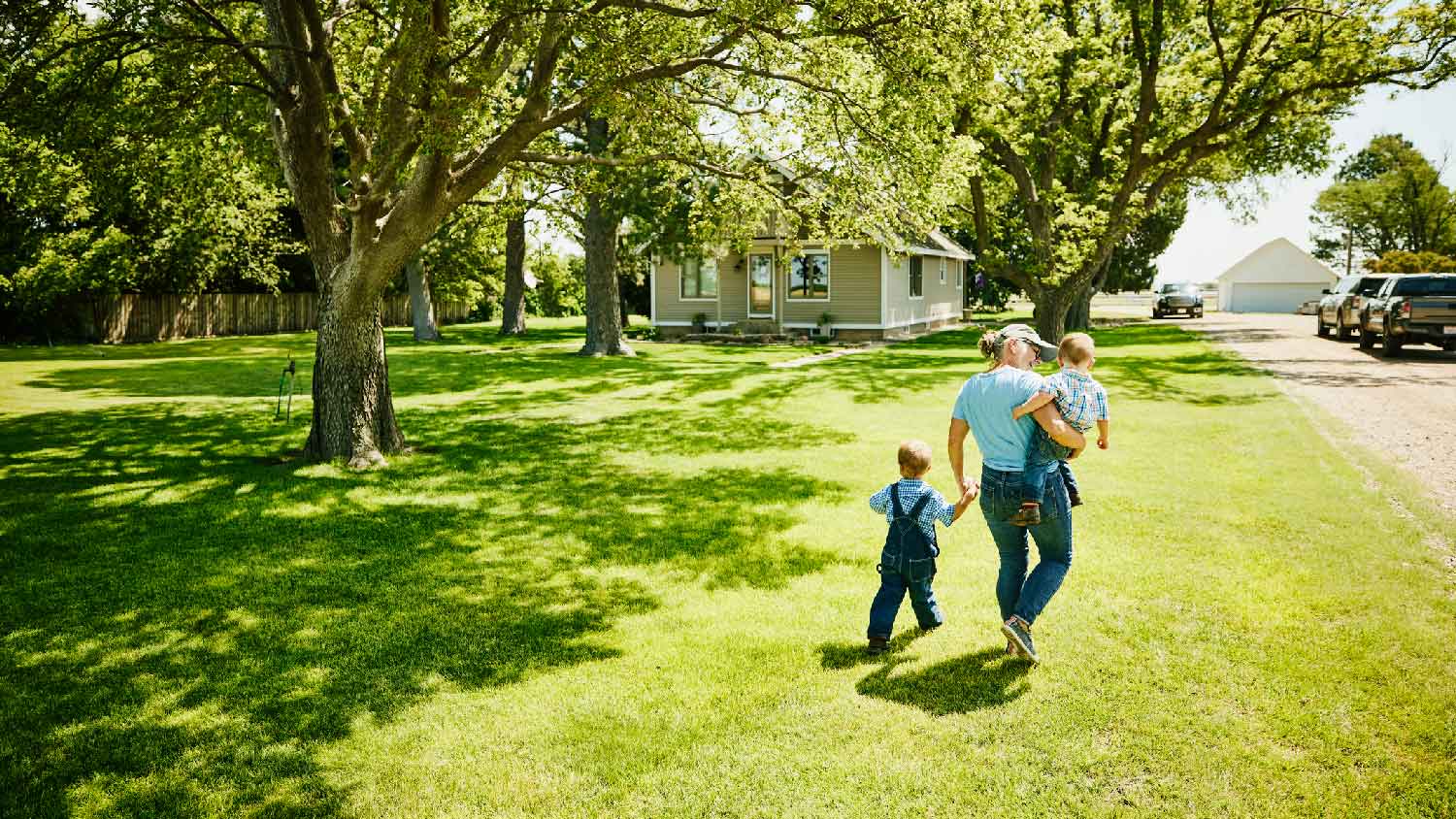
Your total lawn care cost depends on several factors, including the type of service and lawn size. Our guide will cover what you can expect to pay for lawn care.
There's a clear grassy winner, depending on your preferences


Bahia grass requires less frequent maintenance, while Bermuda grass has a more attractive, rich dark-green color.
Bahia grass requires little maintenance but is less attractive.
Both grasses tolerate droughts and heavy traffic well.
Both grasses are excellent for warm-climate lawns.
Bahia and Bermuda grass are heat and drought-tolerant and handle foot traffic well. However, that's where the similarities between these two grass types end.
Unlike fescue grass that easily tolerates cold temperatures, these lawn grass types grow best in warm climates despite their winter dormancy when they turn brown. Depending on your maintenance and appearance preferences, there's a clear winner in the Bahia vs. Bermuda grass debate, but a lawn care professional can also recommend the best option for your home.
While both types of grass can tolerate various growing conditions, Bahia grass requires less overall maintenance than Bermuda grass. On the other hand, Bermuda grass's lush dark-green appearance is generally preferable over Bahia's lighter shades. The key difference between the two comes down to maintenance versus appearance.


Bahia grass is a lawn grass that grows best in warm climates. It has a light green and open appearance that can look thin and sometimes clumpy. Bahia grows relatively slowly but handles foot traffic adequately and recovers well after damage.
Bahia's most significant selling point is its low maintenance requirements. Due to its slow growth, lawn mowing and fertilizing are infrequent tasks. Its deep roots help make it drought-tolerant. However, it will turn brown each dormant season and during dry spells.
| Pros | Cons |
|---|---|
| Tolerates partial shade | Turns brown when dormant |
| Tolerate sandy soil | Grows slowly |
| Requires only one feeding per year | Can grow unevenly |
| Drought tolerant |
Best for:
Homeowners who desire a low-maintenance lawn
Households in warm climates with less-than-ideal soil
Homeowners who are content with their lawns look less-than-perfect during the dormant season
Bahia grass is primarily a plant-it-and-forget-it type of lawn grass. Thanks to its drought tolerance, it grows well, albeit slowly, after sod installation. Its long root system does well in sandy soil, meaning Bahia's ease of maintenance starts before the lawn even goes in where sandy conditions are present.
Once in place, Bahia grass grows slowly yet tolerates plenty of foot traffic. In case of damage, the variety heals well over time. Due to its slow growth, it only requires infrequent mowing. Its slow growth also retains nutrients for a long time, so fertilization is only necessary once each year.
The primary downside of Bahia grass is its tendency to grow thinly and unevenly. This factor can lead to clumpy, thin, or inconsistent appearances. Its light, almost pale, green color that tends to turn brown over dormant months doesn't help in its battle against beauty, either. While the grass recovers well when damage occurs, its slow growth means the process can take a while.

Bermuda grass is a thick, lush, dark-green lawn grass that grows best in warm climates. The variety's speedy growth allows it to recover easily from high foot traffic and damage. However, that same growth speed means it can be aggressive and make its way into garden areas where it's unwelcome. Many homeowners with Bermuda grass yards employ the services of a local lawn care company to manage the variety.
Its extensive root system allows it to tolerate drought despite the possibility of turning brown during dormancy and extended dry periods. While it can tolerate some imperfection in the soil, including somewhat salty conditions, the grass needs a relatively neutral soil pH level of 6.0 to 7.5.
Bermuda grass requires more maintenance. In return for its excellent appearance and soft feel, Bermuda grass lawn owners must maintain the variety with frequent, sometimes monthly, fertilization and frequent mowing down to between one and three inches tall.
| Pros | Cons |
|---|---|
| Grows quickly | Needs frequent mowing |
| Tolerates wide temperature range | Requires frequent feeding |
| Salt tolerant | Needs full sun |
| Drought tolerant |
Best for:
Homeowners who desire a thick, lush, dark-green lawn
Homes with high-traffic lawns
Homeowners who don't mind performing frequent lawn care tasks
The most significant selling point for Bermuda grass is its appearance. Homeowners who desire a thick lawn that can handle plenty of traffic without concerns about the yard's health can appreciate the variety's ability to recover quickly from human damage or prolonged dryness.
Bermuda grass also grows well in a wide temperature range and can handle some saltiness in the soil. These factors make it excellent for helping to maintain a home's curb appeal even in southern and southeastern coastal areas. Because of its fast growth and quick recovery times, Bermuda grass is an excellent sod option when starting a new lawn.
The biggest con of Bermuda grass is one of the same things that makes it desirable. Its rapid and aggressive growth means diligent and nearly constant lawn maintenance. Bermuda grass grows and spreads enough to sneak into gardens and areas where homeowners may not want it.
Its constant need for nutrient replacements through regular fertilization is overshadowed only by its frequent mowing requirements due to its speedy growth. In a vicious cycle, the variety's fast growth means it needs more food, which, in turn, causes it to grow even faster.
Additionally, shady yards aren't a great place for Bermuda grass. The grass needs mostly full-sun conditions to thrive. Relaxing on thick, healthy Bermuda grass under a shady tree simply isn't a thing.
Bermuda grass is the clear winner regarding appearance. Bahia grass's thin, clumpy, matted pale-green appearance doesn't stand a chance against Bermuda grass's thick, dark-green carpet-like appearance.
While both grasses have their own way of handling stress and damage, Bermuda grass and Bahia grass perform well under stress and are generally durable. Bermuda grass recovers well and quickly after heavy foot traffic, damage, and drought. Despite recovering more slowly, Bahia grass resists damage and handles high traffic and drought just as well.
Bahia grass is the hands-down winner in the maintenance category. The variety only requires once-annual feedings, and its slow growth means the task of lawn mowing is infrequent. In stark contrast, Bermuda grass requires nearly constant attention. Frequent mowing and feeding are the reality with this variety, and removing it from unwanted places can happen often. Bermuda grass owners often hire a lawn care service to help with the many tasks.
Both grass varieties handle drought well. However, since Bermuda grass grows and recovers more quickly than Bahia grass, it has a slight advantage. In cases of prolonged drought, both types will recover. However, Bermuda grass will be ready for action in a much shorter timeframe than Bahia.
Bermuda grass needs full sunlight to maintain its health. Neither grass variety is great in shady areas. However, Bahia can tolerate some partial shade locations, making it the winner in this category by a slim margin.
From an ecological standpoint, Bahia grass requires less frequent mowing and fertilization, making it the clear winner in sustainability. While neither grass requires overly frequent watering and can handle dry periods well, Bermuda grass's growing season consists of numerous mowing and feeding sessions.
From average costs to expert advice, get all the answers you need to get your job done.

Your total lawn care cost depends on several factors, including the type of service and lawn size. Our guide will cover what you can expect to pay for lawn care.

Removing an old lawn is often necessary to plant new grass or build a new outdoor structure. Find out what to budget for your lawn removal cost.

How much it costs to rent a lawn aerator depends on what kind you rent and how long you rent it for. Read on for the full details.

Need to know how to kill clover in your lawn? Learn the best methods to get rid of clover weeds without killing your grass or other plants.

Why is my yard so soft and soggy? Use this helpful guide to diagnose the issue and implement a solution that will restore your yard’s health.

Dreaming of a lush lawn but don’t want to wait for seed to grow? Use these sod questions to prep yourself for an easy and stress-free installation.